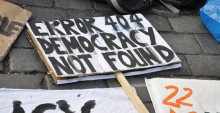Stephen Toope
Rodrigo Duterte is the democratically elected President of the Philippines. On winning power with a robust majority, he declared a “war on drugs.” It is a war like no other. Thousands of citizens merely suspected of being dealers or users have been slain by government forces and independent actors. There’s a creeping fear that such disregard for human rights and the rule of law may spread, affecting others who may be perceived as threats or inconveniences.
Recip Tayyip Erdogan is the democratically elected President of Turkey. In the aftermath of an attempted coup, he is cracking down on the military perpetrators, as he should. He has also used this event to justify summarily firing or jailing at least 80,000 citizens whom he perceives as opponents of his increasingly authoritarian regime: teachers, business people, journalists, judges.
Viktor Orbàn is the democratically elected Prime Minister of Hungary. He came to national prominence in 1989 with a rousing speech demanding withdrawal of Soviet troops and free elections. He served in the country’s first parliamentary democracy. From the outset of his second term as leader in 2010, he has moved to centralize power, curb civil liberties and restrict freedom of speech. He is an open proponent of “illiberal democracy.”
I am worried about the rise of pseudo-democracies in which core democratic values are largely abandoned after each (often highly controlled and manipulated) election. The patron saint of such strong-man leaders is Russia’s Vladimir Putin, who has proved himself a master of retaining both autocratic power and popularity in what’s billed as a democracy.
I’ve cited a few blatant examples in countries we once might have considered beacons of an evolution toward greater civil freedom, protection of rights, open public discourse and engagement. But I and my colleagues are closely watching symptoms of illiberal democracy manifest in a long list of countries including Sweden, Israel, Austria, France, Singapore, Poland, the Netherlands – and now our neighbour to the south. I believe there’s a connection to the ramped-up nativist rhetoric in these places that runs along the lines of: “We must take steps to preserve our national identity, sovereignty and cultural heritage; we must take our country back; make it great again.” It’s puzzling why this is happening in educated and relatively wealthy populations, in regions where large-scale movement of people has been the norm for centuries.
The backlash against global migration tends to be couched as protest against others taking “our” jobs or unfairly straining social systems. But it’s often blatantly revealed as fear of “the other” – people of different colour or beliefs from the dominant culture. Members of that culture look to a strong leader to preserve or reinstate “our” way of life, whatever it takes.
We in Canada have largely been shielded from these developments. In part due to geography and in part due to good public policy, there is not the same level of fear of immigrants overrunning our country – though we certainly can’t claim to have everything right. The Munk School has created an international partnership of over 45 stakeholders working to address the global refugee crisis, and has established a Global Migration Lab that will look at the causes and effects of mass migration, the economics and politics of migration, and the national and global management of migration flows.
Canadians need to be both informed and vigilant. We need to watch for signs of illiberal democracy that could flower here. We need to closely monitor what’s happening elsewhere, think about potential implications and look for ways to resist.
November 15, 2016
